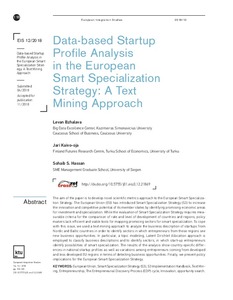Data-based Startup Profile Analysis in the European Smart Specialization Strategy: A Text Mining Approach
Levan Bzhalava; Jari Kaivo-oja; Sohaib Hassan
Data-based Startup Profile Analysis in the European Smart Specialization Strategy: A Text Mining Approach
Levan Bzhalava
Jari Kaivo-oja
Sohaib Hassan
Technological University of Kaunas
Julkaisun pysyvä osoite on:
https://urn.fi/URN:NBN:fi-fe2021042720492
https://urn.fi/URN:NBN:fi-fe2021042720492
Tiivistelmä
Abstract
The aim of the paper is to develop novel scientific metrics approach to the European Smart Specialization Strategy. The European Union (EU) has introduced Smart Specialization Strategy (S3) to increase the innovation and competitive potential of its member states by identifying promising economic areas for investment and specialization. While the evaluation of Smart Specialization Strategy requires measurable criteria for the comparison of rate and level of development of countries and regions, policy makers lack efficient and viable tools for mapping promising sectors for smart specialization. To cope with this issue, we used a text mining approach to analyze the business description of startups from Nordic and Baltic countries in order to identify sectors in which entrepreneurs from these regions see new business opportunities. In particular, a topic modeling, Latent Dirichlet Allocation approach is employed to classify business descriptions and to identify sectors, in which start-up entrepreneurs identify possibilities of smart specialization. The results of the analysis show country-specific differences in national startup profiles as well as variations among entrepreneurs coming from developed and less developed EU regions in terms of detecting business opportunities. Finally, we present policy implications for the European Smart Specialization Strategy.
Kokoelmat
- Rinnakkaistallenteet [27094]
